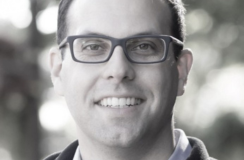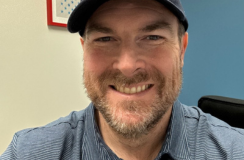assi Niekamp didn’t know a thing about fencing when she bought Bowden Fence, a fence installation & design company based in Columbus, Ohio.
She comes from a background in sales, having worked at a digital marketing startup and then at a small business consulting firm. While Cassi had small business experience and felt inspired by the stories of small business owners, acquiring her own was a giant personal leap.
A “crisis of meaning” that pushed her to consider her purpose and define her life dreams set her on the path to acquire a business.
“I do vulnerability naturally well, it’s something that’s really comfortable for me.”
She was on BizBuySell when she came across Bowden Fence, which was generating between $750,000 and $850,000 in annual revenue and had a 15% net profit margin. She submitted her financials, and she and her husband met the 70-year old owner. Cassi liked how he engaged her in the conversation and didn’t defer to her husband. She liked him personally right away: “I just really kind of fell in love with this man.” This was also a sale with a lot of heart and meaning since he was selling his 38-year-old business.
Cassi considers herself an analytical type and didn’t anticipate buying the first business she reached out to, but the more she dug into it, the more it felt like the right business to acquire. Even her attorney urged her to buy the company.
Doing due diligence on a mom-and-pop business wasn’t easy, but Cassi did some research and knew demand for fencing wouldn’t be an issue. She acquired the business and land for $1.2 million with an SBA loan.
In this episode, she explains why she bought a business in an industry she knew nothing about, the changes she’s made that have led to productivity growth just in the first two months, and why she decided to acquire a business rather than create one from scratch.
She also discusses how she’s navigating the question of whether or not to keep this as a lifestyle business — even though she sees the potential to grow it to a $10 million enterprise.
Check out:
✳️ Top takeaways from the episode
✳️ Episode highlights with timestamps
Acquisition Entrepreneur: Cassi Niekamp
💵 What she acquired: Cassi spent years working in sales before deciding that she wanted to own and run a business. She didn’t know anything about fencing, but Cassi acquired Columbus, Ohio-based Bowden Fence in June 2021 for $1.2 million using an SBA loan.
💡 Key quote: “When I really thought about starting a business from scratch, that honestly just feels so exhausting to me. However, to go in through the lens of — this is what exists today, what can be improved upon — that fuels me. That excites me.”
👋 Where to find her: LinkedIn

Acquisition Tips From the Episode
Top takeaways from this conversation
💼 Doing due diligence on a business that doesn’t track metrics can be tricky — but it’s not always a red flag.
Buying this business wasn’t all “sunshine and rainbows.” By far the biggest challenge for due diligence was that Bowden didn’t have established tracking processes or metrics for stuff like sale conversions. It wasn’t even clear how much of the business was for commercial vs. residential work.
Cassi had to rely on estimates from the owner and information from the P&L. Ultimately, the deal went through after about seven months because she was confident in industry demand (based on Google research) and the profitability of the business. One of the factors that made due diligence tricky was a strength she could ultimately bring to the business: sharing more information about revenues with the employees. She implemented weekly meetings and publicly shared production goals, which hadn’t been done before. She says 80% of the employees have responded really well to this change.
💰 Despite not knowing the industry, Cassi was able to double production in less than two months.
Right off the bat, Cassi took a closer look at metrics and financials. An advisor suggested changing the workers schedule to 4/10 (four days per week, 10 hours per day). There were many inefficiencies with the five-day-a-week schedule, and switching offered many benefits, including a better way to deal with rainy or inclement weather.
She found that workers were only actually getting 25-35 hours a week, and yet there was an eight-week wait from the time a customer signed up to when they’d get the fence installed. Once they made the switch, they could remove the element of surprise, so if it rained on Tuesday, they had Friday to make it up.
👩🏼🎓 Lead by learning — especially when employees have more experience in the industry.
Cassi knew that acquiring a business in an industry she knew nothing about would come with a learning curve, and she knew she needed to leave her ego at the door.
She took a humble and hungry approach to learning.
“I want to be the person in the room asking the most amount of questions and checking my ego at the door,” she says.
“There is so much to be gained when I can put my ownership hat aside or my ego hat aside, whatever you want to call it. And I really was intentional about that fact.”

Episode Highlights
Inflection points from the show
[2:23] From farm girl to fencing: Cassi grew up on a farm, so despite the fact she’s never worked in the trades, she felt comfortable with the blue-collar attitude and workforce because she grew up around it.
[4:38] A desire to make an impact: After working in sales for several years, Cassi went through a “crisis of meaning,” trying to figure out what her dream and purpose in life were. She ultimately decided she wanted to make an imprint on something that she owned.
[6:43] Being seen as an equal: Women can be underestimated in the business world, and Cassi found some people on her quest to acquire a business focused their responses more on her husband. But when they met with the seller of the fencing company, he gave both of them equal attention and respect.
[10:12] Building vs. buying: When deciding whether to buy or build a business, Cassi felt she was more of a “sustainer” than a creator and that her skills lay more in working on improving processes.
[12:19] Fencing financials: Bowden was doing between $750,000 and $850,000 in revenue per year and 15% net profit margins when Cassi became interested in acquiring it — “it kind of looked like a rolling hill,” she says of the historic revenues.
[13:31] Buying a family biz: Taking on a business where almost half the eight-person staff were family members of the previous owner was intimidating — especially with no knowledge of the industry. Cassi focused on creating her own leadership style.
[19:04] Due diligence on a mom-and-pop shop: Like many smaller businesses, Bowden wasn’t meticulous about tracking metrics. So Cassi looked to the P&L when doing due diligence and the seller’s ballpark estimates. But they were ultimately assured that the business had healthy profitability.
[24:12] Opportunity for growth: When evaluating the fencing industry, Cassi used Google to find information about fencing demand and had her attorney give his input.
[25:24] Doubts and speed bumps: From a rocky experience with the lender due to an issue with the land appraisal to getting worried about the enormity of what she was taking on, there were many ways the deal almost didn’t go through.
[27:57] Time to 10X?: Just tracking the estimates that went out in 40 days (prior to this interview), Bowden Fence has sent more than $1 million of quotes — with no marketing. Cassi finds herself at a fork in the road, having to choose if she wants to grow this into a $10 million business or keep it as a lifestyle business.
[32:51] Profits and margins: Bowden’s profit was between $180,000 and $250,000 annually (before the owner’s salary) when the business was acquired. Cassi’s not taking a salary right now, but there’s definitely room if she chooses to.
[35:24] Acquisition price: Cassi and her husband paid $1.2 million for Bowden as well as two acres of commercial property. They used an SBA loan.
[36:29] Acquiring freedom: Acquiring Bowden was part of an overall vision for Cassi’s future financial life, including a desire for more time freedom later on.
[39:31] Creating efficiencies: Cassi shares how she was able to double Bowden’s production in her first two months of ownership by changing up the workers’ schedule.
[42:20] Money breakdown: Cassi talks about how fencing companies make money. For Bowden, installations make up 80% of the business.
[45:41] Lessons learned: One thing Cassi wishes they had done differently is to have met the Bowden team earlier on in the process. Doing so would have made the transition process, especially for the staff, much smoother.
Links & Mentions
✅ RevLocal









%20-%20thumbnail.png)






%20-%20thumbnail.png)



%20-%20thumbnail.png)

.png)




%20-%20thumbnail.png)















%20-%20thumbnail.png)
































































